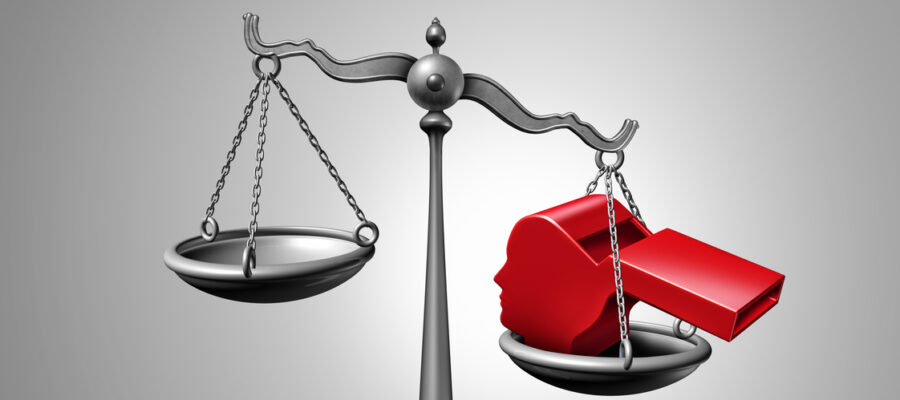Don’t Let the Name Fool You. A Whistleblower System is For Everyone

If you don’t have a whistleblower or reporting system yet, you’re missing out on a vital source of intelligence – especially in an era of high turnover. Employee turnover costs the average organization $41,000 each year!
Whistleblower programs are a way of checking the pulse of an organization on an ongoing basis, and creating a psychologically safe workplace. Every company – regardless of industry and size – should have one in place.
Why You Should Consider a Whistleblower Service.
Often, organizations don’t know what they don’t know. They don’t know what’s bubbling under the surface, what people are too afraid to come forward with, and how comfortable employees feel sharing their grievances to management or senior management.
It’s common for an employee to not come forward with a complaint.
Example I
Imagine this: you’ve just come back from maternity leave with your organization. A few months into your return, you find out that your team member has intentionally been avoiding sending you work that falls under your responsibilities, because you have a newborn baby at home and they don’t want to overload you. You don’t speak up because you have just returned and are set on showing goodwill. They also seem to be really close to your manager. You soon leave the organization for a more maternal-friendly company.
Example II
You’ve been hearing rumours lately that one of the managers openly humiliates her employees in regional meetings. Because you’ve never seen it personally and it’s a different department, you don’t do anything about it. Every week you hear a new story about this manager’s harassment, but it’s become normal to laugh it off and chalk it up to her idiosyncrasies. Nobody takes a stand and churn rate for that department remains high.
A secure and impartial whistleblower channel makes sure information gets to you so it can be dealt with. You will know whether your organization is truly family-friendly or psychologically safe, for example. Without a whistleblower system, issues like the ones illustrated above will continue to exist behind the curtains.
Debunking Whistleblower Myths
“Whistleblower systems encourage trivial complaints”
A common myth is that a whistleblower service is just a conduit for frivolous complaints that will bog down HR. However, the reality is if there’s a problem in your organization it’s going to come out eventually, and it isn’t going to go away without some kind of intervention. It’s better to find out earlier while preventative measures can still be taken, rather than wait for those issues to blow up or go public.
Sure, there may be some unsubstantiated issues that come forward. But in our 20+ years of experience in the field, we’ve learned that it may be just as important to address the perception of those issues to avoid rumours, loss of trust, and lower morale. Doing a proper investigation will allow you to calm that misperception before it causes damage. And it shows to your employees they can trust you to take proactive steps to ensure they are working in a safe environment.
Even better if your reporting system has a built-in process to seamlessly transition to action and/or external investigation, if required (See our reporting service, here).
“Whistleblower systems will make my organization look bad”
Do you know what’s worse than having a whistleblower system? Having a 3.0 star rating on your Glassdoor company review. Even in a small organizations where an internal issue is unlikely to make the news, most aggrieved employees are eager to warn others of their poor experience through company review sites such as Glassdoor or Indeed. In fact, CNBC reports that one in three workers have turned down a job offer after reading negative reviews about a company online.
A whistleblower service is like a risk scan for your organization: it allows you to get the lay of the land and understand which types of issues you may be facing before it gets ugly.
How to Implement a Whistleblower System
There’s lots of ways of implementing a whistleblower system. We have a confidential whistleblower service that allows you to utilize a variety of different communication channels t0 access and make confidential complaints 24/7/365. This includes a web interface, email, or a dedicated hotline.
Take a look at the whistleblower services out there. I think you’ll find they could be very useful to your organization. Once you do find one:
- Include it in your whistleblower policy. Define a clear procedure and what steps you will take when a complaint is made.
- Provide the contact information (e.g – phone number, url, email) of the organization to whom they can report their concern.
- Communicate it. Talk about your policy and reinforce the company’s values in communications to employees, encouraging them to bring their concerns forward.
The bottom line is if you don’t have a reporting system in place right now, you are blind to the risks looming under the surface. If it already is a big issue, you’ll be glad you know about it.
About Dean Benard
Dean has been a professional investigator for almost 30 years, including roles as a police officer, regulatory investigator, Investigations manager, and has run Benard + Associates since 2003 where he and his team have conducted thousands of investigations in regulatory and workplace matters. Additionally, he is an advisor, consultant, coach, and leader in the investigations and conflict resolution communities.
His background educationally includes a nursing diploma from Fleming College, yes he was first a registered nurse working in critical care and research, before he entered the investigative field. He holds a Bachelor of Arts in Health Administration and Ethics from York University, a Masters of Laws in Alternative Dispute Resolution from Osgoode Hall Law School, and has a postgraduate certificate in Diversity and Inclusion from Cornell University.

